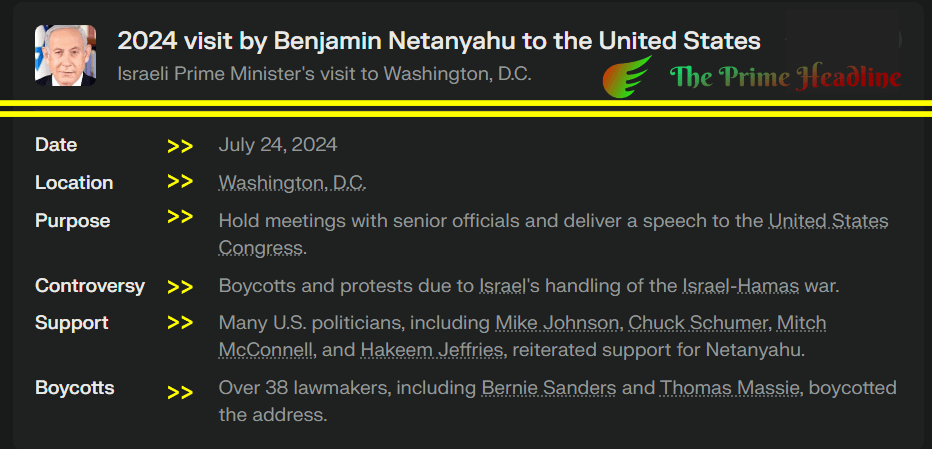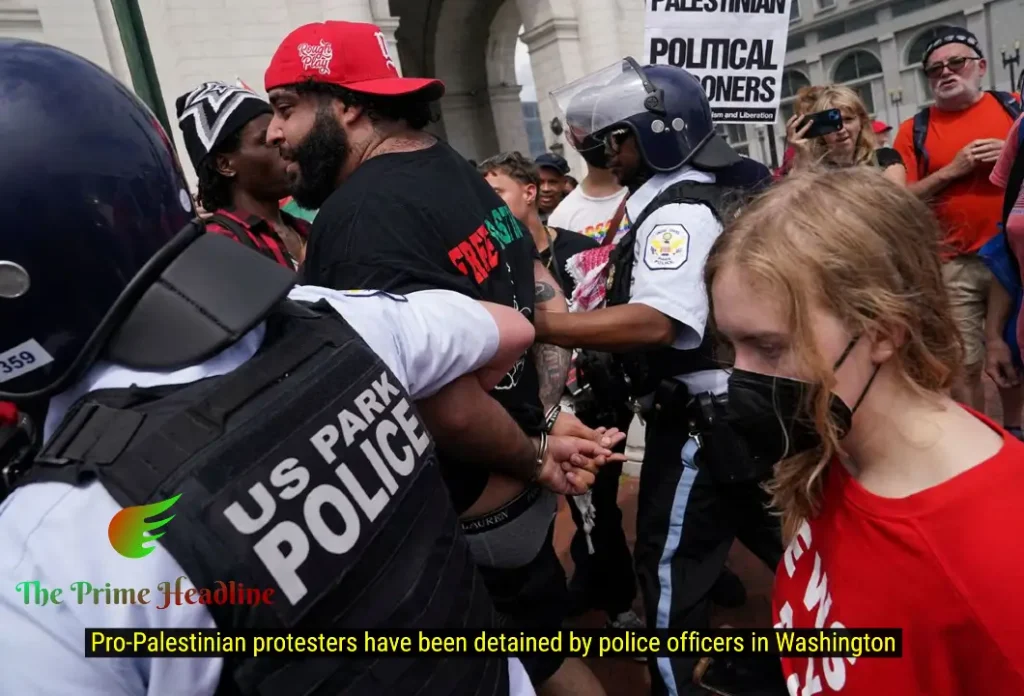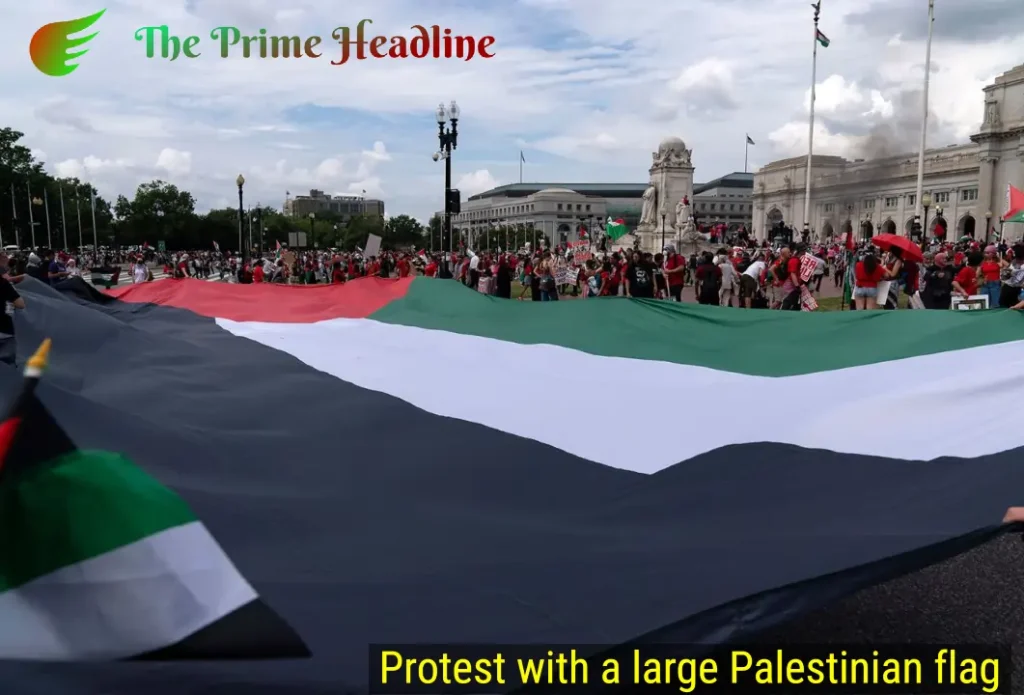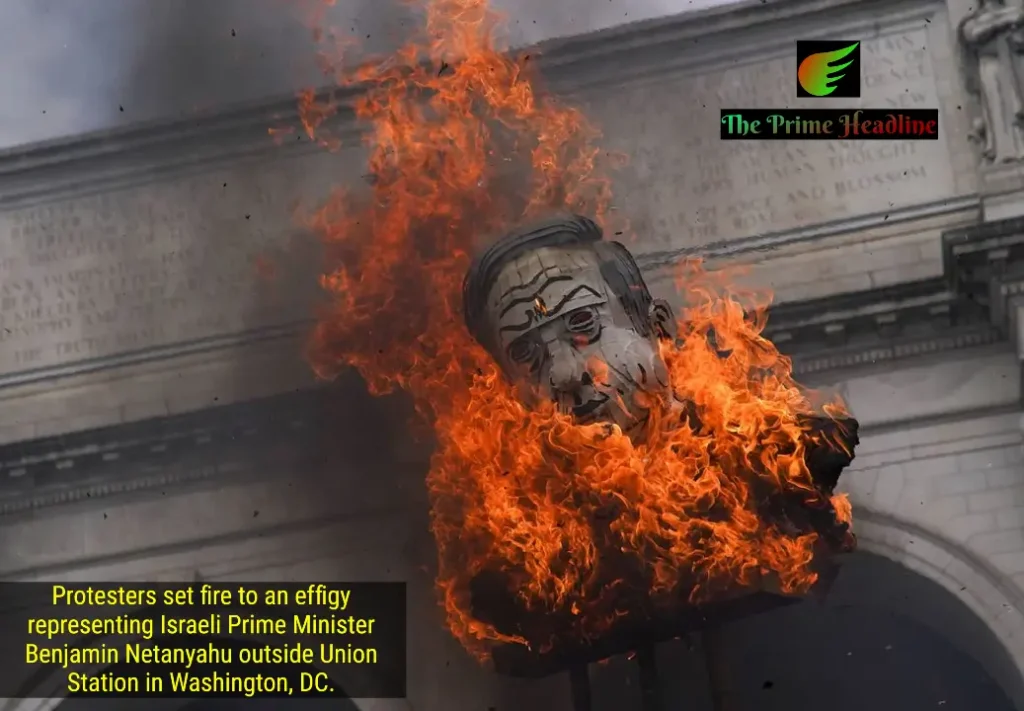
- Israeli Prime Minister Benjamin Netanyahu visited the United States in July 2024 amidst the ongoing Israel-Palestine war in Gaza and significant political upheaval in the US.
- The visit included a speech to a joint session of Congress, meetings with senior US officials, and sparked widespread pro-Palestinian protests.
- Netanyahu’s trip aimed to bolster US support for Israel’s military campaign, secure the release of hostages held by Hamas, and navigate the complex US political landscape.
| 2024 visit by Benjamin Netanyahu to the United States | |
| Israeli Prime Minister’s visit to Washington, D.C. | |
| Date | July 24, 2024 |
| Location | Washington, D.C. |
| Purpose | Hold meetings with senior officials and deliver a speech to the United States Congress. |
| Controversy | Boycotts and protests due to Israel’s handling of the Israel-Hamas war. |
| Support | Many U.S. politicians, including Mike Johnson, Chuck Schumer, Mitch McConnell, and Hakeem Jeffries, reiterated support for Netanyahu. |
| Boycotts | Over 38 lawmakers, including Bernie Sanders and Thomas Massie, boycotted the address. |

Purpose and Context of the Visit
- The visit occurred against the backdrop of the nearly 10-month-long Gaza conflict, which has claimed over 39,000 Palestinian lives, according to the Palestinian Ministry of Health.
- Netanyahu sought to reinforce US diplomatic and military support for Israel’s actions in Gaza, which he framed as a fight against terrorism.
- The trip also aimed to boost Netanyahu’s political standing both in Israel, where he faces declining popularity, and in the US, where he has long cultivated bipartisan support.
- Netanyahu’s address to Congress marked his fourth such speech, more than any other world leader, underscoring his influence in US politics.
Key Events During the Visit
Congressional Address
- On July 24, 2024, Netanyahu delivered a 52-minute speech to a joint session of Congress at the invitation of Republican House Speaker Mike Johnson and other leaders.
- In his address, Netanyahu thanked the US for its support, defended Israel’s military actions in Gaza, and vowed to achieve “total victory” over Hamas.
- He condemned pro-Palestinian protesters as “Iran’s useful idiots” and dismissed calls for a ceasefire, insisting that Hamas must be completely disarmed.
- Netanyahu’s speech was interrupted by protesters, including six guests who were arrested for disrupting the address.

Meetings with US Leaders
- During his trip, Netanyahu held talks with President Joe Biden, Vice President Kamala Harris, and former President Donald Trump.
- In his meeting with Biden, Netanyahu discussed ceasefire proposals and the humanitarian situation in Gaza, with Biden urging consideration of a deal.
- Netanyahu’s discussions with Harris focused on the need to address civilian suffering in Gaza while maintaining US support for Israel.
- The Israeli leader’s meeting with Trump at Mar-a-Lago aimed to mend relations strained since the 2020 election and discuss the Gaza war.
Pro-Palestinian Protests
- Netanyahu’s visit sparked large-scale demonstrations in Washington, D.C., with thousands of protesters gathering to oppose his policies and Israel’s actions in Gaza.
- Protesters represented diverse organizations, including the US Campaign for Palestinian Rights (USCPR), Jewish Voice for Peace, Code Pink, and the Council on American-Islamic Relations (CAIR).
- Demonstrations turned violent at times, with clashes between protesters and police resulting in the use of pepper spray and at least 23 arrests.
- Protesters called for an end to US aid to Israel, the release of hostages held by Hamas, and the arrest of Netanyahu on war crimes charges.

Political Reactions and Implications
US Lawmakers’ Responses
- Netanyahu’s speech drew mixed reactions from Congress, with many Republicans expressing strong support while some Democrats boycotted or criticized his remarks.
- Over 50 House Democrats, including Alexandria Ocasio-Cortez and Nancy Pelosi, skipped the address in protest of Netanyahu’s policies.
- Prominent Senate Democrats, including Bernie Sanders and Elizabeth Warren, condemned Israel’s actions in Gaza and urged a ceasefire.
- Republicans accused boycotting Democrats of antisemitism and disloyalty to Israel, highlighting partisan divisions on the issue.
Impact on US-Israel Relations
- Netanyahu’s visit underscored the strained relationship between his government and the Biden administration, despite ongoing US military aid to Israel.
- Progressive Democrats increased pressure on Biden to condition or restrict US assistance based on Israel’s human rights record and treatment of Palestinians.
- However, top Democrats, including Biden, Harris, Senate Majority Leader Chuck Schumer, and House Minority Leader Hakeem Jeffries, reiterated their fundamental support for Israel.
- Republicans sought to portray themselves as stronger allies of Israel, with Netanyahu’s praise of Trump’s policies serving as an implicit endorsement.
Influence on 2024 US Elections
- Netanyahu’s trip coincided with a pivotal moment in the 2024 presidential race, following Biden’s withdrawal and Trump’s assassination attempt.
- The Israeli leader’s visit and the divisive reactions it provoked had the potential to influence the positions and strategies of candidates in both parties.
- For Democrats, the challenge of balancing support for Israel with concerns over human rights and calls for accountability became more acute.
- Republicans saw an opportunity to highlight divisions among Democrats and appeal to pro-Israel voters by contrasting their unequivocal backing of Netanyahu with the opposition voiced by some Democratic lawmakers.
Regional Dynamics and Peace Prospects
Stalled Hostage Negotiations
- Securing the release of Israeli hostages held by Hamas was a key priority for Netanyahu during his visit, particularly after the death of two captives.
- However, Netanyahu’s confrontational rhetoric and Hamas’s demand for a comprehensive prisoner exchange complicated efforts to reach a deal.
- The US and other mediators, such as Egypt and Qatar, continued to engage with both sides to facilitate hostage negotiations and prevent further escalation.
Ceasefire Challenges and Long-Term Peace
- Despite growing international pressure, including from the Biden administration, Netanyahu remained resistant to accepting ceasefire terms without significant concessions from Hamas.
- Israel’s insistence on the complete disarmament of Hamas and the return of hostages, coupled with Hamas’s refusal to lay down its weapons, posed major obstacles to ending the fighting.
- Netanyahu’s speech offered no clear pathway to a comprehensive peace agreement between Israelis and Palestinians, focusing instead on military victory and post-war arrangements in Gaza.
- The prolonged conflict and the absence of a viable political solution raised concerns about the humanitarian toll, regional stability, and the prospects for a sustainable peace.
Saudi Arabia’s Stance and Regional Implications
- The reaction of Saudi Arabia, a key US ally and potential partner for Israel, to Netanyahu’s visit and the Gaza war was closely watched.
- Saudi officials issued measured statements expressing support for Palestinian rights while avoiding direct criticism of Israel or the US.
- Crown Prince Mohammed bin Salman was expected to face pressure to take a clear position on the conflict and the future of Gaza, with potential implications for the kingdom’s relations with both the US and Israel.
- Netanyahu’s efforts to rally support against Iran and its regional proxies, including Hezbollah in Lebanon, added another layer of complexity to the geopolitical landscape.
Humanitarian Crisis and Aid Efforts
Civilian Toll and Infrastructure Damage
- The Gaza conflict has exacted a heavy civilian toll, with thousands of Palestinians killed, wounded, or displaced by Israeli airstrikes and ground operations.
- Israel has faced accusations of disproportionate force and targeting of civilian infrastructure, including homes, schools, and hospitals.
- The fighting has also severely damaged Gaza’s already fragile infrastructure, disrupting access to electricity, clean water, and medical care.
Humanitarian Assistance and Access Challenges
- International organizations and aid agencies have struggled to provide adequate humanitarian assistance to the besieged Gaza Strip.
- Israel’s strict blockade, which predates the current conflict, has limited the flow of essential goods and materials into Gaza.
- During his visit, Netanyahu disputed claims that Israel was obstructing aid deliveries, blaming Hamas for stealing supplies intended for civilians.
- However, human rights groups and the United Nations have called on Israel to allow unimpeded access for humanitarian workers and supplies.

Long-Term Recovery and Reconstruction Needs
- Even if the immediate fighting ends, Gaza faces daunting challenges in rebuilding its shattered infrastructure and economy.
- Years of conflict, blockade, and political instability have left the territory’s 2 million residents heavily dependent on external assistance.
- Reconstruction efforts will require significant international aid and investment, as well as cooperation between the Palestinian Authority, Hamas, and Israel.
- The political and security obstacles to Gaza’s long-term recovery, including the unresolved issues of Palestinian governance and Israel’s security concerns, remain formidable.
Media Coverage and Public Opinion
International Media Attention
- Netanyahu’s visit and the ongoing Gaza war attracted extensive global media coverage, with outlets providing live updates and analysis of key events.
- International media generally portrayed the conflict as a humanitarian crisis, highlighting the disproportionate impact on Palestinian civilians.
- However, media coverage also reflected political divisions, with some outlets more critical of Israel’s actions and others emphasizing Hamas’s role in the fighting.
US Media Landscape and Public Discourse
- In the US, media coverage of Netanyahu’s trip and the Gaza situation varied along ideological lines, mirroring the polarization in Congress.
- Conservative outlets tended to frame the visit in positive terms, echoing Netanyahu’s narrative of Israel’s fight against terrorism and right to self-defense.
- Liberal media sources were more likely to focus on the civilian toll in Gaza, the protests against Netanyahu, and the concerns raised by progressive Democrats.
- The partisan divide extended to public opinion, with polls showing a growing gap between Democratic and Republican voters’ views on Israel and the Palestinian cause.
Social Media and Grassroots Activism
- Social media platforms played a significant role in shaping public discourse and mobilizing activism around Netanyahu’s visit and the Gaza conflict.
- Pro-Palestinian activists used hashtags, shared videos and images of the protests and the destruction in Gaza, and coordinated online campaigns to pressure US lawmakers.

- Israel’s supporters also leveraged social media to defend Netanyahu and Israel’s actions, accusing critics of antisemitism and spreading misinformation.
- The online battles often mirrored and amplified the divisions seen in the streets and in the halls of Congress, underscoring the polarizing nature of the issue.
Legal and Human Rights Dimensions
International Criminal Court Investigation
- The International Criminal Court (ICC) has opened an investigation into alleged war crimes committed by both Israel and Hamas in the occupied Palestinian territories.
- During his visit, Netanyahu denounced the ICC probe as a “travesty of justice” and accused the court of unfairly singling out Israel.
- However, human rights organizations and some UN officials have argued that the investigation is necessary to ensure accountability for violations of international law.
- The US has opposed the ICC’s involvement, arguing that it lacks jurisdiction over Israel and that the court’s actions could undermine peace efforts.
Accusations of Human Rights Violations
- Israel has faced widespread accusations of violating international humanitarian law and human rights standards in its conduct of the Gaza war.
- Critics have pointed to the high civilian death toll, the targeting of residential areas and infrastructure, and the use of disproportionate force as evidence of potential war crimes.
- Israel has defended its actions as necessary to protect its citizens from Hamas rocket attacks and tunnel infiltrations, while accusing Hamas of using civilians as human shields.
- The debate over Israel’s adherence to international law and the appropriate response to its military actions has divided legal experts and policymakers.
US Legal and Policy Framework
- US laws, including the Arms Export Control Act and the Leahy Law, place conditions on military assistance to countries that commit gross human rights violations.
- Some members of Congress have called for investigations into Israel’s use of US-supplied weapons in Gaza and for restrictions on future aid based on human rights concerns.
- However, efforts to limit or condition US assistance to Israel have faced strong opposition from pro-Israel lawmakers and advocacy groups, who argue that such measures would undermine Israel’s security.
- The complex legal and political landscape surrounding US aid to Israel has made it difficult for critics to translate their concerns into concrete policy changes.
Overall Summary
- Netanyahu’s visit to the US in July 2024 took place against the backdrop of a devastating war in Gaza, a deeply divided Congress, and a turbulent presidential election.
- The Israeli leader’s speech to Congress and his meetings with US officials aimed to shore up support for Israel’s military campaign and secure the release of hostages, but offered no clear path to ending the conflict.
- The visit sparked widespread protests and a fierce debate over the future of US-Israel relations, Palestinian rights, and the prospects for peace in the Middle East.
- As the war in Gaza grinds on and the humanitarian crisis deepens, the international community faces urgent challenges in addressing the root causes of the conflict and preventing further loss of life.
- The political fallout from Netanyahu’s trip and the broader tensions it exposed are likely to reverberate through the 2024 US elections and beyond, shaping the contours of US foreign policy and the search for a just and lasting resolution to the Israeli-Palestinian conflict.
FAQs:
Why was Netanyahu’s visit to the US this year controversial?
Netanyahu’s visit was controversial due to his handling of the ongoing war with Hamas and the treatment of Palestinians, which divided opinions in Washington.
What were the key events during his visit?
Netanyahu addressed Congress, met with President Biden, Vice President Kamala Harris, and former President Donald Trump, and attended a memorial service for former Senator Joe Lieberman.
How might the visit have impacted cease-fire efforts?
The visit could have either bolstered pressure for a cease-fire deal or been seen as a delaying tactic, depending on Netanyahu’s engagement in the negotiations.
What was the international response?
The visit drew protests and criticism, especially from those who opposed Netanyahu’s policies and actions during the war.
What was the main purpose of Netanyahu’s visit?
The primary purpose was to address the United Nations General Assembly in New York and also to get more support and weapons.
Did Netanyahu meet with President Biden during this visit?
Yes, Netanyahu met with President Biden at the sidelines of the UN General Assembly, marking their first face-to-face meeting since Netanyahu’s return to power.
How did Netanyahu’s visit impact US-Israel relations?
The visit highlighted ongoing tensions between the two allies, particularly regarding Israel’s domestic policies and the Palestinian issue, while also emphasizing their shared strategic interests in the Middle East.
What was the reaction to Netanyahu’s UN speech?
Netanyahu’s UN speech was met with mixed reactions, with some praising his focus on regional security and others criticizing his stance on Palestinian issues and domestic policies.
Related Resources:
- https://www.aljazeera.com/news/2024/7/24/key-takeaways-from-netanyahus-speech-and-the-protests-outside-us-congress
- https://time.com/7003081/photos-netanyahu-washington-dc-protests-demonstrations-police-clashes-arrests-capitol/
- https://www.bloomberg.com/news/articles/2024-06-07/netanyahu-invited-to-address-both-houses-of-congress-on-july-24
- https://www.latimes.com/politics/story/2024-07-26/netanyahus-high-profile-u-s-visit-is-buffeted-by-politics-here-and-at-home
- https://www.wilsoncenter.org/article/360deg-reactions-netanyahus-address-us-congress-01
- https://www.aljazeera.com/news/2024/7/26/netanyahu-meets-trump-at-mar-a-lago-capping-trip-marked-by-gaza-protests
- https://www.theguardian.com/us-news/article/2024/jul/24/netanyahu-congress-protests-security
- https://foreignpolicy.com/2024/07/25/netanyahu-congress-speech-biden-israel-trump-republicans-democrats/?tpcc=recirc_latest062921
- https://www.bbc.com/news/videos/cgxqp3p2ep8o
- https://edition.cnn.com/2024/07/22/middleeast/benjamin-netanyahu-washington-dc-visit-mime-intl/index.html
- https://www.reuters.com/world/israels-netanyahu-heading-washington-with-us-flux-over-election-race-2024-07-22/
- https://news.cgtn.com/news/2024-07-25/Protesters-hoist-Palestinian-flags-in-Washington-during-Netanyahu-speech-1vvYGOOH63C/p.html
- https://en.wikipedia.org/wiki/2024_visit_by_Benjamin_Netanyahu_to_the_United_States
- https://www.aljazeera.com/amp/program/inside-story/2024/7/27/what-did-benjamin-netanyahus-us-trip-achieve






